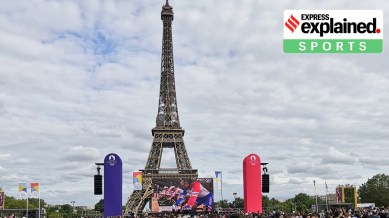Why are Russian athletes ‘banned’ from the 2024 Paris Olympics?
The International Olympic Committee has banned athletes from representing Russia and Belarus in the ongoing Olympics. However, some are participating under a neutral banner. Here’s why.

Athletes from Russia and Belarus have been banned from participating in the ongoing Paris Olympics under their nations’ official flags. Many of them are instead competing under a separate category called Athlètes Individuels Neutres or AIN in French, meaning Individual Neutral Athletes.
Russian President Vladimir Putin earlier said, “Thanks to some of the leaders of the modern International Olympic Committee, we learned that an invitation to the Games is not an unconditional right of the best athletes, but a kind of privilege.” He said it showed the Games can be used for “political pressure against people who have nothing to do with politics. And as gross, and in fact racist, ethnic discrimination.”
monthly limit of free stories.
with an Express account.
What’s behind the move? We explain.
Why are Russia and Belarus banned from participation?
The International Olympic Committee (IOC) initially sanctioned the two nations soon after the Russian invasion of Ukraine began in 2022, just days after the Winter Olympics ended in Beijing on February 20, 2022. It said the invasion had violated the Games’ Olympic Truce, which says nations are not to attack one another from one week before the Olympic Games to one week after the Paralympic Games. The Paralympics are held shortly after the Olympics.
Belarus was also implicated for allegedly allowing Russia to use its territory for military purposes. Its western border is with Russia, while Ukraine borders it on the south.
In October 2023, the Russian Olympic Committee was officially suspended after it declared its authority over Ukrainian sports organisations in Donetsk, Kherson, Luhansk and Zaporizhzhia — regions the IOC recognised as part of the Ukrainian Olympic Committee.
The IOC also cited Russia’s International Friendship Association (IFA), formed to conduct the Summer and Winter Friendship Games, as a political body and a blatant violation of the IOC charter. The charter says, “Recognising that sport occurs within the framework of society, sports organisations within the Olympic Movement shall apply political neutrality”.
After Russia announced its Friendship Games for September 2024, the IOC said the Russian government “launched a very intensive diplomatic offensive” by having its delegations, ambassadors, and other governmental authorities approach governments globally, describing it as “a cynical attempt by the Russian Federation to politicise sport.”
However, the concept of “political neutrality” is not based on any objective criteria and it can be difficult to arrive at a consensus on its interpretation, especially in large-scale global competitions. Critics also note that athletes from Israel, whose military invaded the Gaza Strip despite international condemnation last year, continue to be official participants.
So who can participate from Russia and Belarus?
The IOC announced in 2023 that Russian and Belarusian athletes can participate in the Olympics, provided they don’t represent their country or any associated organisation. Any athlete actively supporting the Russian invasion of Ukraine cannot compete.
According to the IOC, “AINs are athletes with a Russian or Belarusian passport who have qualified through the existing qualification systems of the International Federations (IFs) on the field of play.”
The move aims to allow athletes to compete and improve their stature as athletes. While 32 athletes accepted the invite, another 28 who qualified declined the offer. The athletes will compete under a neutral flag and wear a neutral uniform. If they win medals, a neutral song will be played in place of their country’s national anthem. The audience also cannot wave their flags.
Has Russia been banned from the Olympics before?
Yes. In 2017, the World Anti-Doping Agency (WADA) reported a major scandal where over 1,000 individuals had benefited from a state-sponsored doping scheme between 2011 and 2014. This included athletes who won medals at the 2014 Winter Olympics in Sochi, Russia.
The IOC then issued a ban, but individual athletes were allowed to apply as “Olympic athletes from Russia”. In the 2018 Winter Olympics in Pyeongchang, South Korea, 168 Russians cleared the vetting process, while 45 others did not.
In 2019, the WADA also voted to ban Russia from the 2020 Tokyo Olympics and the 2022 Beijing Winter Olympics. Russia lost the right to bid for or compete in tournaments and government officials were banned from attending major Olympic events. At the Tokyo Olympics, Russian athletes competed under the Russian Olympic Committee (ROC) banner.
Are independent athletes competing in the Olympics for the first time?
No. The Olympics has had a history of allowing athletes to participate as independent or neutral athletes.
Following the dissolution of the USSR, some athletes from the region competed in the 1992 Summer Olympics in Barcelona, Spain, as independent participants under the Olympic flag. This was allowed as the former Soviet states did not have Olympic committees.
The Indian Olympic Association was suspended from the IOC in 2014, due to its failure to comply with the Olympic Charter and its statutes relating specifically to “good governance”. Three athletes who qualified for the Winter Olympics could compete under the Olympic flag. With the reinstatement of the Indian association on February 11, days after the games commenced, two of the three athletes could compete under the Indian flag with their events to be held in the remaining days.
In the 2016 Olympics at Rio de Janeiro in Brazil, the IOC allowed the formation of the Refugee Olympic Team so that athletes from displaced regions could compete.